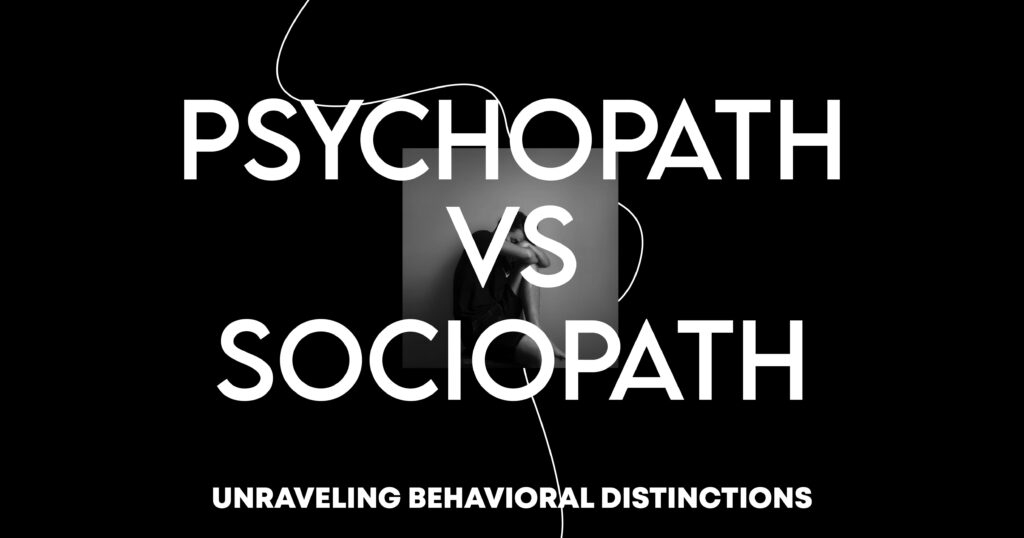The first thing that probably pops into your head when you hear “psychopath” or “sociopath” is some Netflix villain with creepy eyes or a true-crime documentary about a mastermind criminal. Thanks to pop culture, we’ve been trained to picture the scariest version possible.
But actually, these terms weren’t created for just movies. They do exist in real life, and they’re also a lot less dramatic.
People tend to throw “psychopath” and “sociopath” around like they mean the same thing. They might overlap in some areas, but they’re definitely not the same thing.
And that’s where knowing the difference helps. Not just for trivia or casual knowledge, but because it can help you identify these personalities in real life and help you position yourself so you’re not affected by their actions.
What Defines a Psychopath?
Think of a psychopath as that person who’s almost too calm. Their entire world can be on fire, and they’d still have that calm, cold expression on their face. They wear it like a mask. They’re calculated and always in control of their emotions. They know exactly how to keep a straight face even when doing things that would make most people feel guilty.
Sociopaths can be messy and impulsive. Psychopaths, on the other hand, are the opposite. They think three steps ahead, keep their emotions tucked away, and hardly ever let the mask slip. That’s why they’re harder to catch. You don’t notice until you’re already tangled up in their plans.

In everyday life, it’s not always movie-villain dramatic. It could be that boss who’s everybody’s favorite in meetings, but secretly throws people under the bus to look good. Or maybe that “super caring” friend who somehow always gets their way, while you’re left wondering how you ended up doing all the work.
Nashville Mental Health
Characteristics and Traits of Psychopathy
Here are some common traits of psychopaths.
- Surface charm: They know how to make you feel comfortable.
- Manipulation: They’re masters at pulling strings without showing their hand.
- Lack of empathy: Feelings? Not really on their radar.
- No real conscience: They know right from wrong, but they don’t feel it.
- Calculated behavior: Nothing’s random – it’s all thought through.
What Defines a Sociopath?
Instead of being calm and calculated, sociopaths are hot-headed and impulsive. They also don’t follow rules. They’re like contact mines – they explode once triggered. These are the reasons they struggle to hold down jobs and maintain relationships.
Where psychopaths wear a polished mask, sociopaths’ behaviors are often harder to hide.
Characteristics and Traits of Sociopathy
Here’s what tends to stand out with sociopathy:
- Impulsivity: They jump into risky situations without thinking ahead.
- Emotional outbursts: Anger, frustration, or irritation can flare up quickly.
- Weaker planning skills: Long-term plotting isn’t really their thing.
- Some conscience: They know right from wrong and might feel guilty sometimes. This, however, doesn’t always stop them.
- Difficulty with stability: Work, money, or relationships often end up shaky.
Psychopath vs. Sociopath: Comparing Key Traits
A lot of the time, people classify both psychopaths and sociopaths as the same thing. This couldn’t be further from the truth. There are a lot of differences between them.
Psychopaths are calm and collected. They’re calculated, and always a few steps ahead. They can have a huge smile on their face while shaking your hand, whereas they’re secretly pulling all the strings in the background.
Sociopaths are polar opposites. They’re loud and reckless and can’t hide their emotions to save their lives. They’re also built like fuse and are a lot more reckless with their choices.
Lining them up side by side makes it easier to see just how different they both are.
| Trait | Psychopath | Sociopath |
| Empathy | Basically absent | Weak, but sometimes present |
| Conscience | Knows right/wrong but doesn’t feel it | Has a conscience, though inconsistent |
| Impulsivity | Rare – highly calculated | Common – acts on impulse |
| Emotional regulation | Calm under pressure | Explosive or reactive |
| Manipulation | Polished and strategic | Direct and messy |
So, in short, the difference between a psychopath and a sociopath lies in control. Psychopaths control themselves to control you. Sociopaths? Not so much.
The Role of Genetics and Environment
Okay, so where do these traits even come from? Are people born this way, or do life experiences shape them? The classic debate of nature vs. nurture comes into play here.
Nature Vs. Nurture: Influences on Psychopathy and Sociopathy
- Genetics: Studies suggest psychopathy has stronger genetic ties. It’s more about how the brain is wired.
- Environment: Sociopathy often links more with environment. Think childhood trauma, neglect, or chaotic family life.
| Influence | Psychopathy | Sociopathy |
| Genetics | Strong influence | Some influence |
| Upbringing/Trauma | Less central | Very central |
| Brain Structure | Often shows measurable differences | Not as clearly distinct |
Can Sociopathy or Psychopathy Be Inherited?
The answer to this question is not as clear-cut. But here’s a rundown of an interplay of factors that can contribute to a person developing psychopathy:
- Genetics matter. Research shows that traits linked to psychopathy and sociopathy can run in families. If close relatives show those patterns, there’s a higher chance it could pop up again.
- But the environment is a massive influence. What an individual passes through during childhood like those trauma-like events, the kind of environment he grew in, and the style of parenting the person was exposed to also come into play, and they play an active role in determining if those traits will eventually manifest.
- It’s a mix, not a guarantee. Think of it as a light bulb that’s wired to electricity. The potential to shine is there, but the light bulb needs to be switched on.
Here’s another way to put it. Take the genes as a seed. No matter how potent the seed is, if it doesn’t find the right conditions (environment), then it never grows to become the plant it can be.
So, it’s not just about DNA. It’s the combination of nature and nurture that really writes the story.
Nashville Mental Health
Treatment and Management Options
The first thing to remember is that there is no known or permanent cure for both psychopathy and sociopathy. The only route is managing them. It’s also important to note that managing both conditions can be a bit challenging, and here’s why:
- Psychopathy is more difficult to manage because psychopaths don’t exactly lean into empathy and emotional regulation so well.
- Sociopathy, while challenging, may respond better to therapy, especially when caught early.
Some common approaches include:
- Cognitive Behavioral Therapy (CBT): This can help to look out for harmful thought patterns and equip them with tools to combat them.
- Medication: While there’s no standard cure, drugs like mood stabilizers, e.g., sodium valproate, antidepressants, e.g, sertraline, and antipsychotics, like risperidone, may help with impulsivity or mood regulation.
- Long-term support: Building a consistent structure in life can make a big difference.
| Approach | Psychopathy | Sociopathy |
| CBT | Limited success | Moderate success |
| Medication | Helps with related symptoms | Helps with related symptoms |
| Environment/Support | Less impactful | More impactful |
Get Help From Nashville Mental Health
Dealing with someone who’s got strong psychopathic or sociopathic traits can feel overwhelming, and honestly, trying to figure it all out on your own is exhausting. That’s why having people who actually understand these conditions in your corner makes a huge difference.
At Nashville Mental Health, you’ll find individuals who understand the ups and downs of antisocial personality disorders and how they affect real life, like work, family, relationships, all of it. They can help you sort through the chaos and find a plan that actually works for you.
If any of this is hitting close to home, don’t just sit with it. Reach out to Nashville Mental Health and start getting the support you deserve.

FAQs
What are the main differences between psychopathy and sociopathy in terms of empathy and emotional regulation?
Psychopaths don’t really do feelings. Sociopaths, on the other hand, actually feel emotions, just way too intensely. One minute, they’re relaxed, the next minute, they’re like a fuse in full-blown mode.
How do psychopaths and sociopaths differ in their levels of impulsivity and manipulation?
Psychopaths play the long game. They plan, they scheme, they keep it polished. Sociopaths make quick decisions, messy outcomes, and are not as good at hiding it.
What role does conscience play in distinguishing between psychopathy and sociopathy?
If psychopaths feel bad, it’s usually because they got caught. Sociopaths sometimes feel guilty, but they’re pros at talking themselves into thinking it was justified.
How do antisocial personality disorder traits manifest differently in psychopaths versus sociopaths?
Psychopaths are good at disguising They might be charming, successful, and seem totally normal while hiding dark traits. Sociopaths are harder to miss. They’ll pick fights, take dumb risks, and their relationships are usually rocky.
Nashville Mental Health
What are the genetic and environmental influences on the development of psychopathy and sociopathy?
Psychopathy leans more toward being “born with it.” Sociopathy usually has a messy backstory, like a rough childhood, trauma, or neglect. Basically, one is more nature, the other more nurture.





